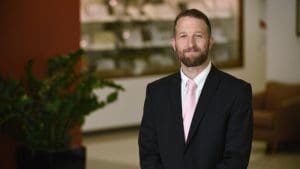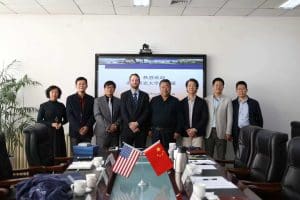Human and Cultural Element. Member Spotlight: Jake Bucher
Jake Bucher is a founding dean of the College of Applied Social Sciences at Dominican University, Illinois, USA. He first got introduced to mediation while serving in the US Military, by pursuing training in conflict resolution. Later when he decided to pursue a career in higher education, the center of his work became providing training for mediators. Dominican University offers a Master of Arts in Mediation and Conflict Resolution, and Mediation and Conflict Resolution Certificates. Programs taught by experts take students deep into psychology, ethics, and alternatives to the courts, and provide skills in understanding the nature of conflict and how to resolve it. Currently Jake and the faculty, through partnerships with Mediators Beyond Borders International, are taking the training to the international level through initiatives and partnerships leading to collaborative efforts on mediation training in Morocco, Nigeria, United Arab Emirates, and many other places. As Jake explains, the program is focused on international dispute resolution, restorative justice, and infusing trauma-informed practice into mediation. “We hosted an in-person panel discussion with MBBI in 2022. Given our international work, we wanted to be a partner of the organization and see how we could both contribute and benefit” Jake adds.
The Human Element

Speaking about obstacles he faced in the new role, Jake mentions navigating through different legal systems, different state laws, requirements for mediators, and legal issues. “The biggest obstacle is not just providing training for skills, but then understanding how the environmental context, government policies can create difficulties. It’s not just legal differences and there is always the human element in mediation” Jake says. Awareness of those differences and challenges convinced Jake to put additional effort into looking at every problem as an individual case. He is very proud of his institution which is taking some of the basic skills in mediation and applying them in different ways, not just in the law. The college established a restorative mediation-type approach to students, taking mediation and restorative work to result in some truth and racial healing. “The history of racial oppression still lingers in the US” Jake says, “so using some of the skills that mediators use in legal disputes and taking that to heal communities and mediating some of those issues, around restorative justice is a program that I am proud of”.
Culturally Informed Practice
 Elaborating on the human element, Jake is also speaking about culturally informed practice – another aspect he is proud of. We can read textbooks, and we can read and learn the theory, but that kind of approach is isolated and neutral. The parties, cultural context, and social environment became especially visible when the training was globalized. One of the things the faculty learned is to understand, and do everything in a culturally informed way. What is normal for people in Chicago Illinois, might not be for people in Morocco or Japan. Infusion of a culturally informed mindset into how future mediators are trained is really important. Jake thinks that one of the qualities characterizing a good mediator is that they will always understand human and cultural factors. Unfortunately, many people are acting by the book, and sometimes do not realize they have to adapt the book based on the cultural context of who they are working. We often talk about culturally informed approaches, and being aware of the culture of parties, but what is really important is to recognize your position and cultural influence. For mediators to be able to recognize whether it is privilege or bias or just their own history that they are bringing into mediation, is really important.
Elaborating on the human element, Jake is also speaking about culturally informed practice – another aspect he is proud of. We can read textbooks, and we can read and learn the theory, but that kind of approach is isolated and neutral. The parties, cultural context, and social environment became especially visible when the training was globalized. One of the things the faculty learned is to understand, and do everything in a culturally informed way. What is normal for people in Chicago Illinois, might not be for people in Morocco or Japan. Infusion of a culturally informed mindset into how future mediators are trained is really important. Jake thinks that one of the qualities characterizing a good mediator is that they will always understand human and cultural factors. Unfortunately, many people are acting by the book, and sometimes do not realize they have to adapt the book based on the cultural context of who they are working. We often talk about culturally informed approaches, and being aware of the culture of parties, but what is really important is to recognize your position and cultural influence. For mediators to be able to recognize whether it is privilege or bias or just their own history that they are bringing into mediation, is really important.
Article by Maciej Witek, MBBI Writer
